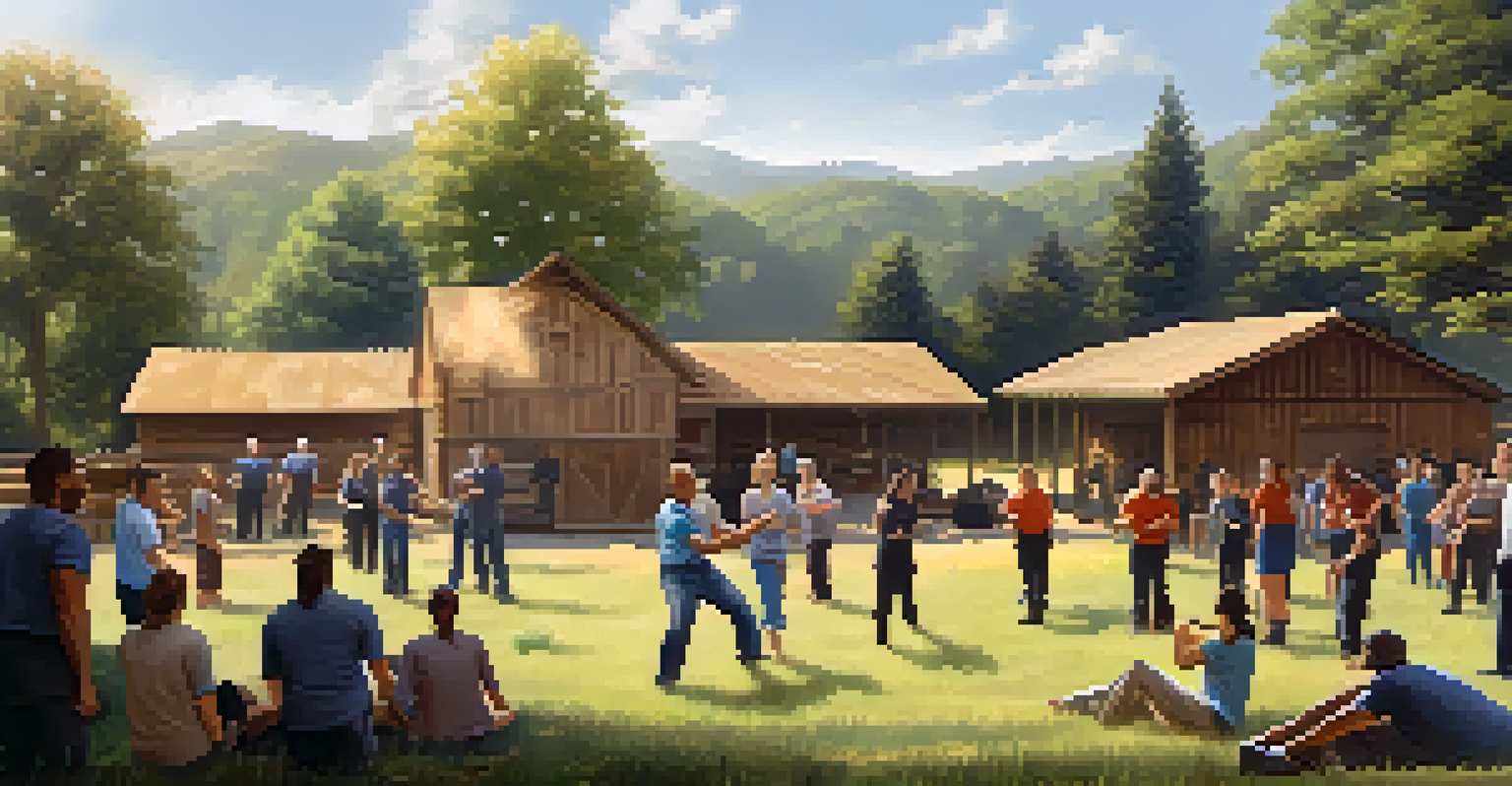Self Defense Psychology: Rural Mindsets and Preparedness

The Unique Psychology of Rural Living
Living in rural areas often shapes a different mindset regarding safety and security. Residents tend to foster a strong sense of community, relying on each other for support. This interconnectedness can lead to a more proactive approach to self-defense, as individuals feel responsible for their neighbors' wellbeing.
The best defense is a good offense.
Moreover, rural dwellers are usually more familiar with their environment, making them attuned to unusual behaviors or changes. This heightened awareness can enhance their ability to recognize potential threats early. The psychological impact of isolation can also drive individuals to be more self-reliant, preparing them mentally and physically for self-defense situations.
In essence, the combination of community ties and environmental familiarity creates a unique psychological landscape. Understanding this mindset is crucial when discussing self-defense strategies that resonate with rural populations.
Preparedness: A Rural Necessity
Preparedness is a cornerstone of rural living, influenced by factors such as remoteness and limited access to emergency services. Residents often take it upon themselves to be ready for emergencies, whether they are natural disasters or personal safety threats. This proactive stance extends to self-defense, where individuals equip themselves with knowledge and skills.

Many rural communities engage in self-defense training, workshops, and discussions that emphasize practical skills. These activities not only provide essential techniques but also foster a sense of camaraderie among participants. Sharing experiences and lessons learned can enhance collective preparedness and resilience.
Community is Key to Safety
Rural residents rely on strong community ties for support and proactive self-defense.
Ultimately, preparedness in rural areas is about more than just individual safety; it is about community strength. When everyone is equipped to handle threats, the entire community benefits, reinforcing the idea that safety is a shared responsibility.
The Role of Trust in Self Defense
Trust plays a pivotal role in rural self-defense psychology. In tight-knit communities, the relationships built over years can significantly influence how individuals perceive threats and respond to them. Trust fosters open communication, allowing residents to share concerns about safety and collaborate on solutions.
Community is much more than belonging to something; it’s about doing something together that makes belonging matter.
This bond can also affect how people react in high-pressure situations. Knowing that neighbors have each other's backs can boost confidence and encourage proactive measures rather than reactive ones. For instance, witnessing a neighbor's defensive actions may inspire others to adopt similar strategies.
In this way, trust not only enhances individual preparedness but also solidifies community defense mechanisms. A united front can deter potential threats, making trust a vital component of effective rural self-defense.
Cultural Influences on Self Defense Mindset
Cultural factors significantly impact how rural residents view self-defense. Traditions, historical experiences, and local values shape perceptions of safety and preparedness. For example, areas with a history of agricultural challenges may prioritize skills that ensure personal safety from wildlife or environmental hazards.
Additionally, cultural narratives around masculinity and femininity can influence self-defense approaches. In some communities, the expectation to protect oneself and others may be more pronounced among men, while women might focus on awareness and avoidance strategies. Recognizing these cultural nuances is essential for tailoring effective self-defense programs.
Preparedness Enhances Resilience
Being prepared for emergencies fosters individual skills and strengthens community safety.
By understanding cultural influences, we can create self-defense strategies that resonate with the values and experiences of rural communities, fostering a sense of belonging while promoting safety.
Technology's Impact on Rural Self Defense
In recent years, technology has dramatically changed how rural residents approach self-defense. Innovations such as smartphones, surveillance systems, and personal safety apps have become integral tools for enhancing security. These technologies help residents stay connected and informed, even in remote areas.
For instance, community apps can facilitate real-time alerts about suspicious activities, allowing residents to respond quickly. The availability of online training resources also enables individuals to learn self-defense techniques at their own pace, improving their preparedness without needing to travel far.
However, while technology offers many advantages, it also presents challenges. Residents must balance reliance on tech with traditional skills and methods, ensuring they remain capable of defending themselves in low-tech situations.
Mental Resilience in Self Defense Training
Mental resilience is a crucial component of effective self-defense training, especially in rural settings. Building mental toughness helps individuals manage fear and anxiety during potentially dangerous situations. This resilience can be developed through various training methods, emphasizing the importance of mindset alongside physical skills.
Practicing scenarios and role-playing can enhance mental preparedness, allowing individuals to visualize their responses to threats. This mental rehearsal can be just as vital as physical techniques, as it helps participants feel more confident when facing real-life situations.
Trust Bolsters Defense Strategies
Trust among neighbors encourages open communication and collaborative safety measures.
Ultimately, instilling mental resilience in self-defense training can empower rural individuals to act decisively and effectively when confronted with danger. By fostering a strong mindset, we can enhance the overall safety and security of rural communities.
Community Engagement in Self Defense Initiatives
Community engagement is essential for promoting self-defense initiatives in rural areas. By involving residents in discussions and planning, we can create programs that address their specific needs and concerns. This collaborative approach also fosters a sense of ownership, motivating individuals to participate actively in self-defense training.
Local workshops and events can serve as platforms for sharing knowledge and experiences. They provide opportunities for residents to learn from each other and build networks of support. Engaging local law enforcement and safety experts can also enhance these initiatives, offering valuable insights into effective self-defense strategies.

Through community engagement, we can create a culture of safety that empowers individuals and strengthens the entire community. When people feel connected and invested in their safety, they are more likely to take proactive measures to protect themselves and their neighbors.